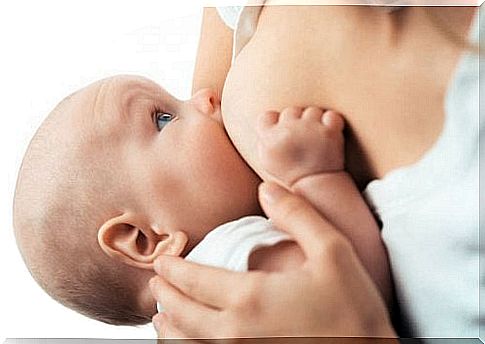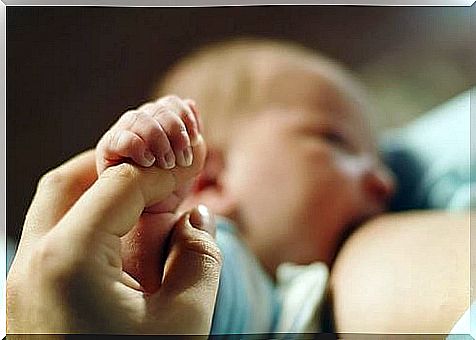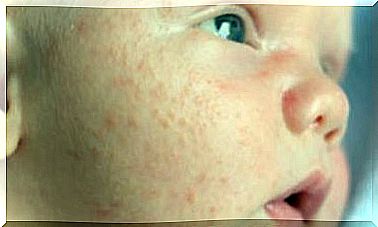Why Breastfeeding Sometimes Makes You Fat

Breastfeeding is a period in which we begin to recover from the main changes that affected us during pregnancy. However, this does not mean that we will stop changing. Sometimes breastfeeding can help us lose those pounds that we put on, but it can also make us gain weight.
Among the benefits of breastfeeding it is not precisely that we gain weight. However, it is something that can happen. In most cases, breastfeeding is recommended so that we expend energy and regain the weight prior to pregnancy.
Some women may notice that they are not losing the weight they wanted while breastfeeding, on the contrary, they seem to be gaining. It is sad that this happens, gaining weight after childbirth is not the plan of any woman. For this there is an explanation, below we will tell you why sometimes breastfeeding makes you fat.
Milk production
According to the specialists, producing milk causes a significant caloric expenditure in the mother. This is the main reason why most of the time women lose weight. It is understood that more than 500 kcal are consumed daily in milk production.
According to this, the hip and thigh areas are the most used fat deposits in this production. Therefore, by using this accumulated fat, the process of weight loss begins to take place.
This occurs in the same way in women who breastfeed. That is why many mothers recommend breastfeeding for this purpose. In some ways, it is productive to breastfeed your baby to lose weight. However, sometimes it is the other way around. Why are some women unable to lose weight while breastfeeding?
Women who gain weight while breastfeeding
As explained above, it is a fact that many calories are consumed just from breastfeeding. However, this is not always complemented by external factors in the right way. In other words, the breastfeeding mother does not always feed in the best way.

It is known that during the first months of life, the little one does not sleep completely. Therefore, the mother does not rest in the desired way. This tiredness needs to be compensated by ingesting more amounts of energy. In this sense, the body demands more calories and we please it.
So if we don’t compensate for breastfeeding with a healthy diet, there could be unwanted results on our weight. It is a fact that we will have more hunger and less energy, therefore, the insulin needs will be compensated with more sugar.
Sometimes some women are able to metabolize nutrients so that they do not gain weight. However, many others not only do not lose weight, but also gain weight. This also happens to women who claim that they do not eat so badly. In these cases, endocrine disorders can be considered, those that most affect body weight are those related to the thyroid, as stated in an article published in the journal “Lancet”.
Hormonal changes occur during pregnancy that lead to the absence of menstruation. Consequently, low levels of estrogen slow down metabolism and lead to fluid retention.
Postpartum thyroiditis
After delivery, little by little everything returns to normal. However, it sometimes happens that the hormonal changes of pregnancy develop into a more complex disorder. These types of conditions are diagnosed with postpartum blood tests. Mainly processes such as postpartum thyroiditis, which occurs due to inflammation of the thyroid, are recognized. This is indicated by an article published in the journal “Clinical Obstetrics and Gynecology.”

Although it is not one of the most notorious conditions, it occurs in up to 16% of mothers. At the beginning, a relative weight loss can be perceived. Already in the second phase, it can happen that our thyroid function normalizes or becomes hypothyroidism.
Hypothyroidism generates a series of symptoms ranging from depression to weight gain. Sometimes the presence of this disorder already exists during pregnancy, without having been diagnosed. This causes it to manifest itself more clearly in lactation.
Lack of control of hypothyroidism during pregnancy is one of the main causes of breastfeeding making you fat. It is understood that the imbalance subsides by itself, after a year and a half after giving birth. This coincides with weaning, which creates an expectation about weight loss at the end of breastfeeding.
Improve your diet to avoid gaining weight during the postpartum period
Although there may be conditions that promote postpartum weight gain, in most cases this situation is motivated by poor lifestyle habits. Remember to eat correctly, in a varied and balanced way. In addition, exercising frequently will be a way to speed up the weight loss process.










